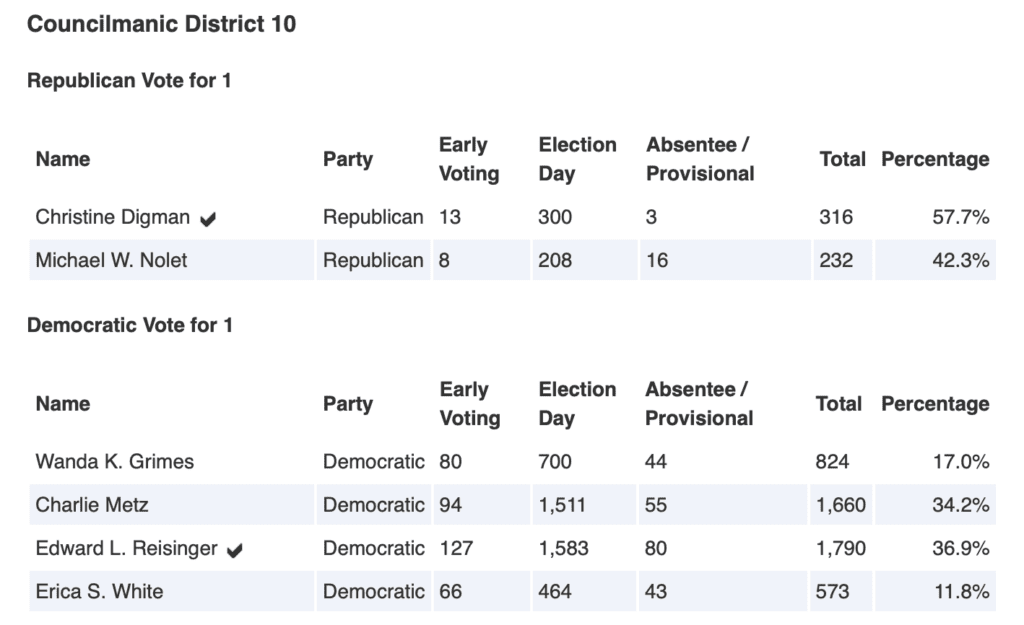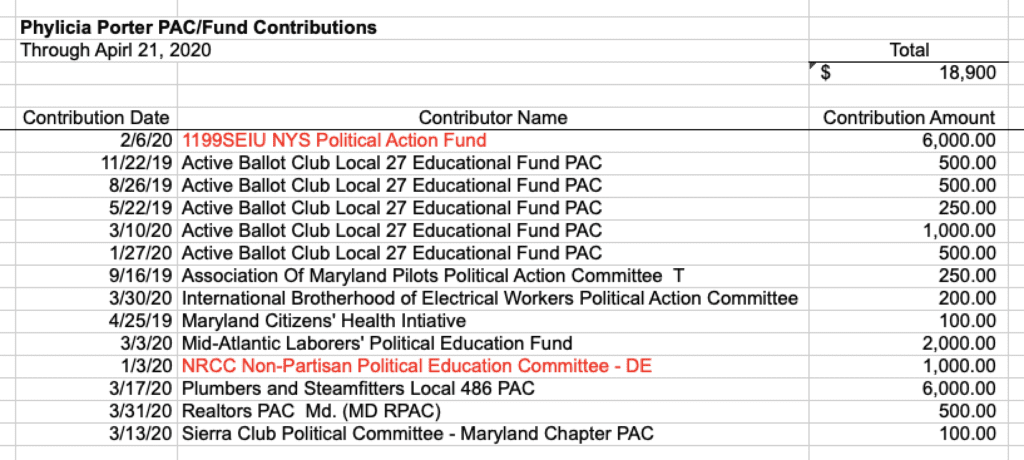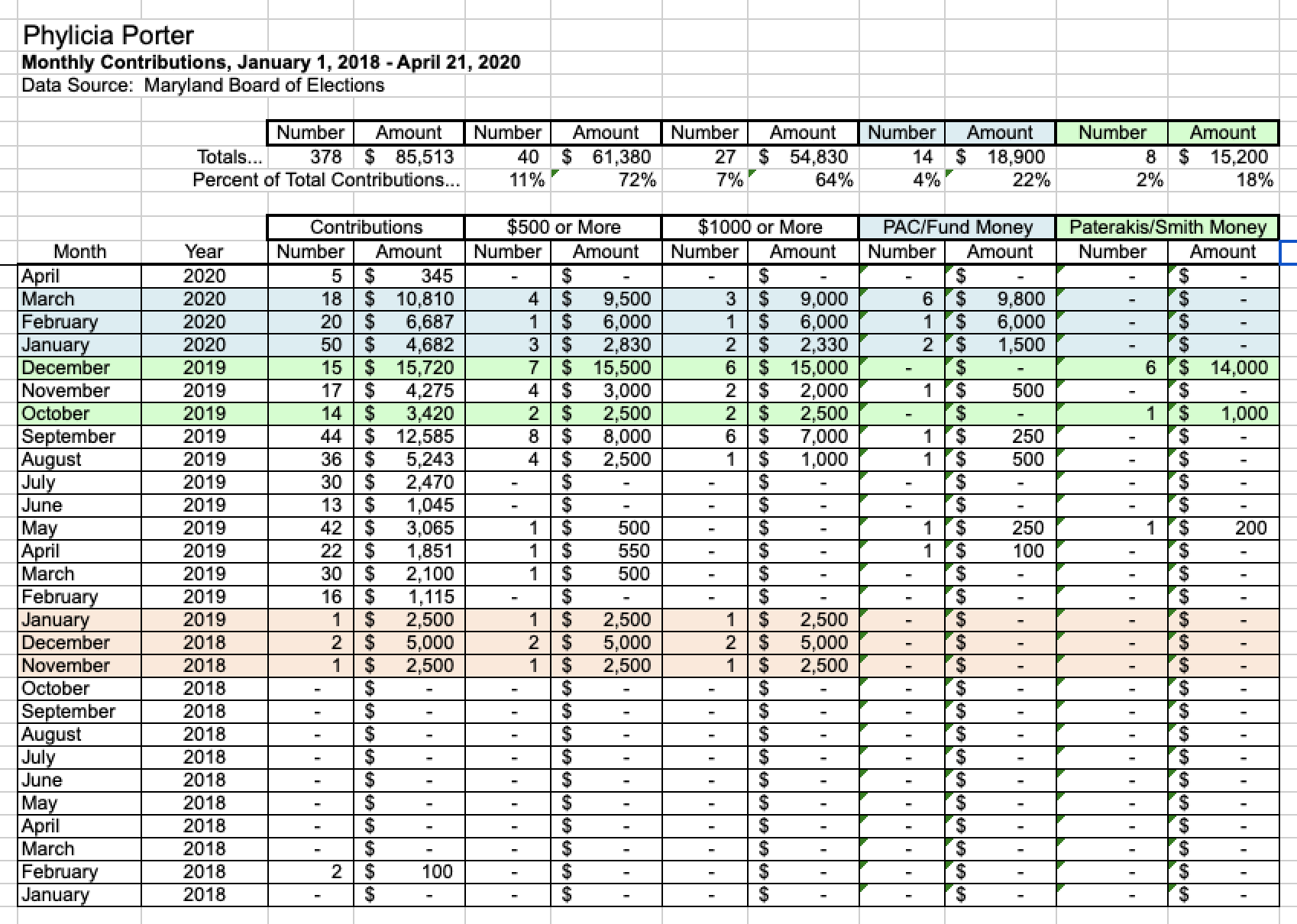Phylicia Porter
District 10 Democrat candidate for Baltimore City Council.
Problematic campaign financing.

District 10 Candidate Phylicia Porter
Maryland-based Local Initiatives is committed to encouraging campaign finance reform in order to reduce the influence of money on the outcome of primary and general elections. In pursuit of this objective, we have been studying the campaign contributions made to candidates in selected races, most recently, for the Mayor and City Council of Baltimore.
This article is about the Council race for the Democratic Party nominee to City Council from Baltimore’s 10th district. District 10 runs between the harbor and the southwest border of the city. It’s where Pigtown, a/k/a Washington Village, M&T Bank/Ravens stadium and the Horseshoe Casino are located. It’s geographically large, containing a mix of residential and industrial properties.
Politically, as of July 2019, District 10 has 15,732 registered Democrats, 2511 Republicans and 3625 independents, that is, people who registered as “Unaffiliated.” All total, that’s 21,868 registered voters.
The last primary was in April of 2016. As you can see in the Board of Elections table below, there were only 4 candidates. Ed Reisinger, the long-time incumbent, won with only 1790 votes. That’s only 36.9% of the total 4847 votes cast. Mr. Reisinger was re-elected in the general election later that year, but he’s retiring and is not running this time.

And yes, those are the numbers. In 2016, with only 4 candidates running for the Democratic Party nomination, all it took was 1790 votes to be elected to the Baltimore City Council. And now, there are 9 candidates running. It’s actually conceivable that one of them could win with less than 1000 votes. And even if the winner gets 2000 votes, it’s still true that the vast majority of actual voters, not to mention registered voters, wanted someone else to represent them. We call it “minority rule.” We need to change the way we elect our leaders.
There are 9 Democrats competing to replace Mr. Reisinger. This article is about the campaign contributions received by one them, Phylicia Porter, whose campaign website is www.Porter4Baltimore.com. This is Ms. Porter’s first run for City Council.
We’re focusing on Ms. Porter’s contributions for these reasons…
1. As you can see from the monthly contributions table below, just 8 of the total 378 contributions Ms. Porter’s campaign committee has received since February of 2018 were from persons or companies related to the very prominent, very successful Paterakis family. (See the columns headed “Paterakis/Smith Money.”) They made just 8 contributions totaling $15,200 which is, round numbers, 18% of the total $85,513 she has raised.
2. Just 14 of Ms. Porter’s 378 contributions came from PAC (Political Action Committees) or Funds. Just 14 contributions – 4% of the total number of contributions she has received – account for $18,900 or 22% of the total dollars she collected.
Here’s a list of the PACS/Funds who contributed to her campaign…

Notice that one of the PACs contributed 5 times to Ms. Porter’s campaign, totaling $2750. More importantly, two of the PACs aren’t even from Maryland. Note, in particular. the maximum $6000 contribution from “1199 SEIU NYS Political Action Fund,” a New York state entity representing service employees.
3. Overall, just 40 contributions of $500 or more accounted for $61,380 or 72% of total contributions received. And only 27 contributions of $1000 or more, just 7% of the total number of contributions that Ms. Porter received, accounted for $54,830 which is 64% of the total dollars she collected.
4. In November and December 2018 and January 2019 – from November 24, 2018 through January 4, 2019 – Ms. Porter’s campaign received only 4 contributions. Each of the 4 contributions was $2500, exactly.
What concerns us about these contributions?
– Well, for one thing, they were each for precisely the same amount.
– The amounts of the contributions are unusually large for her campaign, particularly that long ago.
– She wasn’t running for anything at the time. Incumbent Ed Reisinger didn’t announce he was retiring until May of 2019.
– And her campaign reported no expenses, $0.00, during this same period.
So why did Ms. Porter need the money? $10,000? Perhaps in anticipation of her running for City Council later?
– And because it is our sense of these contributors that they are not, for financial reasons, likely to have made contributions this large. To our knowledge, they are neither wealthy nor were they making contributions on behalf of a politically active corporate entity.
Conclusion.
For these reasons, we recommend that Democrat voters in Baltimore’s 10th District ask the following questions about Phylicia Porter before voting to elect her to represent them on the City Council…
– Whose calls will she be answering first when the phone rings in her office at City Hall? Calls from one of the her major, special interest contributors or from her constituents who couldn’t afford to make such generous contributions?
– Whose problems will she work hardest to resolve first?
– For whom will Councilwoman Porter be working during her tenure on the City Council?
– Is there, in fact, a problem with those 4 $2500 contributions in late 2018 and January 2019?


